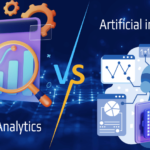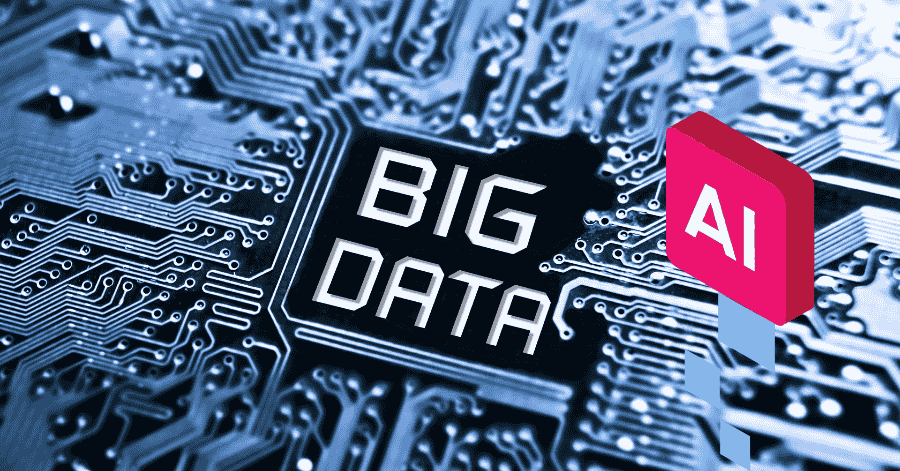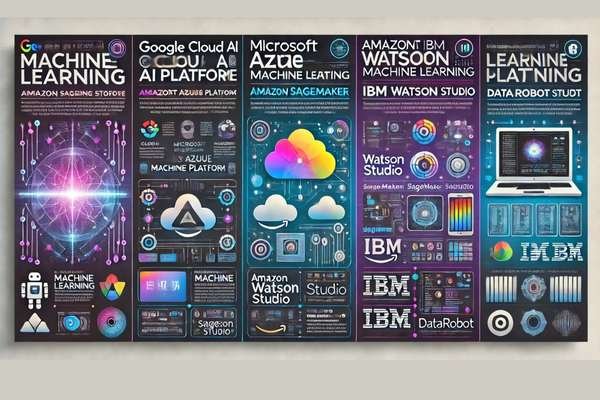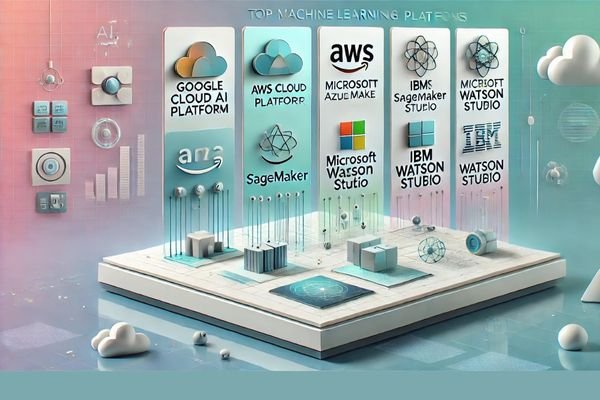
How AI Analytics Are Revolutionizing E-commerce
September 13, 2024
AI vs Traditional Analytics Which One Is More Efficient
September 14, 2024The Role of AI in Big Data
Artificial intelligence (AI) has become an integral part of the modern digital landscape, especially when it comes to managing and analyzing big data. With the exponential growth of data in the digital age, businesses, developers, and marketers are constantly seeking efficient ways to extract valuable insights from vast datasets. This is where AI steps in.
AI technologies are specifically designed to process large amounts of unstructured data, uncover hidden patterns, and predict trends that humans alone may overlook. This combination of AI and big data allows for more informed decision-making, increased efficiency, and improved customer experiences. However, with the ever-evolving digital ecosystem, it’s crucial to understand the best AI tools and platforms available for managing big data effectively.
In this article, we will explore the essential AI-powered tools and platforms that professionals in digital marketing, content creation, and development should consider. We’ll also dive into how AI can streamline big data analysis, helping organizations make smarter, data-driven decisions.
Table of Contents
1. The Synergy of AI and Big Data
AI and big data are often discussed together due to their complementary nature. While big data refers to the massive volume of data generated daily, AI is the driving force that allows organizations to make sense of it. AI algorithms can analyze big data in real-time, providing actionable insights that help businesses stay ahead of their competition.
1.1 How AI Transforms Big Data Processing
AI doesn’t just make big data more manageable—it revolutionizes how it’s processed. By using machine learning (ML) models, AI can sift through enormous datasets, detecting patterns and correlations that would otherwise go unnoticed. This is particularly valuable in industries like e-commerce and digital marketing, where AI-powered data analytics can predict consumer behavior, optimize ad targeting, and personalize user experiences.
For example, platforms like Google Analytics 360 leverage AI to provide businesses with real-time insights into customer behavior, segmenting users based on their interactions and preferences.
1.2 Predictive Analytics: A Game-Changer for Marketers
Predictive analytics is one of the most powerful applications of AI in big data. It involves using historical data to predict future outcomes, helping marketers craft more effective strategies. AI-driven tools like IBM Watson Analytics allow marketing professionals to predict customer trends, optimize campaigns, and boost ROI by leveraging big data insights.
According to a recent study, businesses that adopt predictive analytics are 20% more likely to achieve higher profits, showcasing the direct impact of AI-powered data tools on business success.
2. Key AI Tools for Big Data Management
AI tools for big data management are critical for professionals who need to process vast datasets efficiently. These tools not only make it easier to extract insights but also allow for quicker decision-making.
2.1 Apache Hadoop: The Backbone of Big Data Processing
Apache Hadoop is one of the most well-known platforms for big data storage and processing. It utilizes AI algorithms to distribute large datasets across multiple servers, enabling faster analysis. Hadoop’s ecosystem also includes tools like Hive and Pig, which further enhance data processing capabilities with AI-based analytics.
Why Choose Hadoop? (H4)
- Scalable: Ideal for businesses dealing with vast amounts of data.
- Cost-efficient: Allows for large-scale data storage without breaking the bank.
- Flexible: Supports various data formats, making it versatile for different industries.
2.2 Google Cloud AI: A Powerful Platform for Developers
For developers and content creators, Google Cloud AI offers a suite of AI-powered tools designed to manage and analyze big data seamlessly. With features like AutoML and BigQuery, Google Cloud AI simplifies data analysis by using machine learning models to process large datasets quickly. It’s particularly useful for real-time data analysis in industries such as e-commerce, healthcare, and finance.
Key Benefits of Google Cloud AI
- AutoML: Allows users to train machine learning models without requiring deep technical knowledge.
- BigQuery: Enables the real-time analysis of large datasets.
- Integrations: Connects easily with existing business tools and platforms for seamless data flow.
2.3 IBM Watson: AI for Advanced Data Analytics
IBM Watson is another AI platform specifically designed for big data analytics. With its machine learning capabilities, Watson helps businesses uncover patterns, predict future trends, and automate data processes. Its natural language processing (NLP) features also allow companies to analyze unstructured data like customer reviews, emails, and social media conversations.
Features of IBM Watson
- Natural Language Processing (NLP): Extracts meaning from unstructured data.
- Predictive Analytics: Offers insights into future business trends based on historical data.
- Automated Data Processing: Reduces the need for manual data entry and analysis, saving time and resources.
3. How AI Platforms are Shaping the Future of Big Data
AI platforms are not only helping businesses make sense of their data but also shaping the future of data analytics. As AI continues to evolve, it will enable more advanced big data solutions that can process larger datasets with greater accuracy.
3.1 The Rise of Autonomous AI Systems
Autonomous AI systems, such as Microsoft Azure AI, are transforming how businesses interact with big data. These systems use AI to autonomously manage, process, and analyze data without human intervention. This allows companies to automate decision-making, making the data analysis process faster and more efficient.
3.2 Enhancing Data Privacy and Security with AI
With the increasing volume of data comes the need for enhanced data security. AI plays a crucial role in safeguarding sensitive information through machine learning algorithms that detect and prevent cyberattacks. Tools like Splunk use AI to monitor network activity in real-time, alerting companies of potential threats before they can cause harm.
The Role of AI in Big Data, Reap
| AI Tool | Key Features | Use Cases | Learn More |
|---|---|---|---|
| Apache Hadoop |
|
| Visit Hadoop |
| Google Cloud AI |
|
| Learn More |
| IBM Watson |
|
| Explore Watson |
| Splunk |
|
| Visit Splunk |
Frequently Asked Questions
1. How does AI improve big data analysis?
AI enhances big data analysis by using algorithms and machine learning models to process large datasets quickly. It identifies patterns, trends, and correlations that would otherwise be difficult to detect manually. This leads to faster decision-making and more accurate predictions.
2. What are the best AI tools for big data management?
Some of the best AI tools for managing big data include Apache Hadoop, Google Cloud AI, and IBM Watson. Each of these tools offers unique features that help businesses process and analyze data more efficiently.
3. How does predictive analytics benefit digital marketers?
Predictive analytics allows digital marketers to use historical data to predict future consumer behavior, optimize campaigns, and improve targeting. AI-driven tools like IBM Watson Analytics and Google Analytics 360 enable marketers to forecast trends, leading to more effective marketing strategies.
4. What role does AI play in data security?
AI plays a vital role in data security by using machine learning algorithms to detect potential threats, monitor network activity, and prevent cyberattacks. AI-powered tools like Splunk provide real-time security monitoring, helping businesses safeguard sensitive data.
Conclusion
The integration of AI into big data analysis is transforming how businesses operate in the digital world. By leveraging advanced AI tools and platforms, professionals in marketing, development, and content creation can gain actionable insights, optimize processes, and stay ahead of industry trends. From predictive analytics to autonomous systems, AI is revolutionizing the way we handle data, making it an indispensable resource in today’s data-driven economy.
As AI continues to evolve, its role in big data will only grow, offering more opportunities for businesses to harness its potential. By adopting AI-powered tools and platforms, organizations can ensure they remain competitive in an increasingly complex digital landscape.








